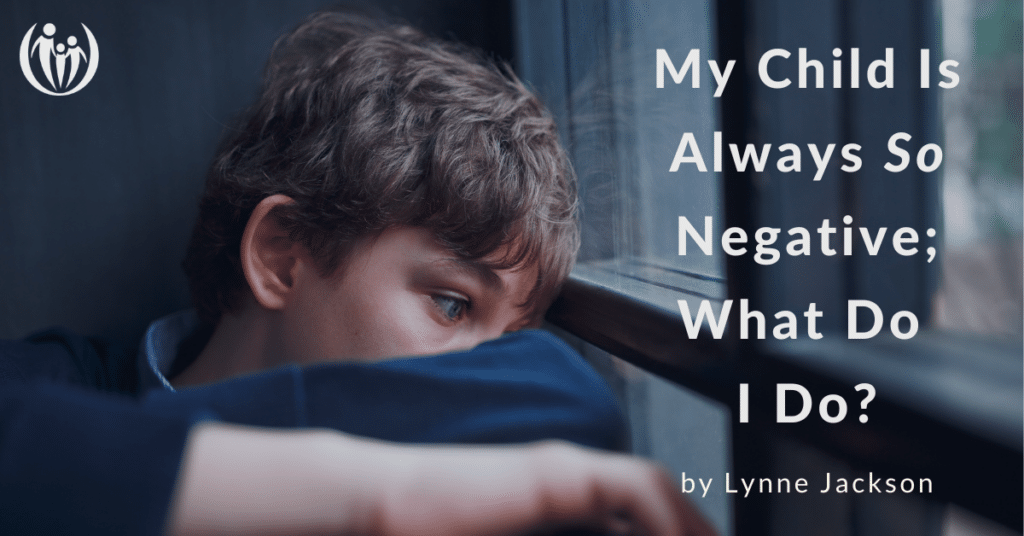
My Child Is Always So Negative; What Do I Do?

Do you have a negative child? You know, the one that seemingly sees the worst in every situation? Have you ever asked yourself, “Why is my child so negative all the time?” Kyle and Ella came to me for coaching, concerned that their 6-year-old daughter, Maya, was “always negative about everything.”
“What can we do to change that?” they asked.
Knowing that children (and people) are rarely “always” anything, I recognized that Kyle and Ella had stumbled into the pitfall of extreme thinking and were bringing their judgments about Maya’s negativity to their interactions with her.
Have you assigned the “negative child” label to one of your kids?
Judgments we have concerning our children can cloud our thinking. (Jim and I know this is true from our early parenting days!) Sadly, these judgments overflow in subtle but powerful messages to that child. For example, when parents believe a child is “always negative,” this passes on a message that, “You’re a problem that constantly needs to be fixed” or “You are incapable of being anything but negative.”
Does this leave you feeling discouraged and stuck? You’re not alone! Many parents struggle with this challenge of being prone to negativity as you parent a child who is prone to negativity! You don’t need to stay stuck. Read on for ideas to equip you.
There are two primary questions to answer when dealing with a child’s struggle with negativity.
1. Reflect: How negative is my negative child? How not negative are they?
Kyle and Ella were sincere and eager to learn, so I asked a few more questions: “On a scale of 1-10, where 1 is ‘truly always negative, never a positive emotion’ and 10 is ‘the most positive child in the world,’ where would you place Maya?”
The parents answered, “Three.”
“What keeps your number from being a one?” I asked. They responded quickly, “Oh, when she’s happy, she’s filled with joy.”
So, not a totally negative child.
As I probed deeper, Kyle and Ella began to shift from their exaggerated perception of Maya to an accurate, helpful perspective: Maya is a passionate, sensitive child. She feels both frustration and joy deeply but seems to be discouraged fairly often. Not quite the same as “always negative about everything”!
Getting an accurate picture of Maya’s true feelings set the stage for the next question…
2. Who is responsible for the negative feelings?
Often, when children express negative emotions, parents’ knee-jerk reaction is driven by the parents’ own anxiety. We try to control or “fix” those feelings because they make us uncomfortable.
- “Oh, honey, it’ll be ok. Look on the bright side.”
- “Don’t be upset. We’ll buy you another one.”
- “I’m sure your friend really didn’t mean that. I know she really likes you.”
- “Don’t be discouraged. You’re a good soccer player!”
As we talked, it became clear to Kyle and Ella that instead of an approach geared toward needing to fix Maya, they could instead change to focus on helping her learn to better identify and manage her emotions herself.
Giving extra attention to frequent negative displays of emotion reinforces the wrong message. Kids may learn they get more attention when they are irritable or negative.
But what if your child could be equipped to own their feelings without you telling them how to feel?
How to help a “negative” child without trying to “fix” their feelings
Does Kyle and Ella’s story hit a little close to home for you? Are you empathizing with these parents? If so, here are some questions and first steps to consider:
1. Become aware of your own feelings and beliefs under the surface. For example, extreme thinking by parents can make a child prone to extreme thinking as well. What grace-filled truths can you hang on to so you can show up in your interactions with your child with the peace and resilience that you want to model for them? For example, “It’s a tough day around here, but there are so many things I can be grateful for in it.” “My child is on a long learning curve. They don’t have to figure out how to manage their emotions on my timetable.”
Katie, one of our Connected Families Certified Parent Coaches, stated, “A friend asked how my day was, and I said, ‘Great!’ Then I realized one of my kids had been having a difficult time, but I had supported him without getting stuck in the frustration, too. I told my friend and we celebrated my growth! ”
2. Communicate a message of, “We love you no matter what! Good mood or bad mood, we love you!” Instead of mirroring your child’s angst, you can smile, offer a hug, and say, “It’s ok to have a rough day and feel crabby sometimes.”
3. Communicate to your child that their emotions are theirs to feel, understand, and respond to. “I know what it’s like to feel like life is just not cooperating! That’s hard. You’ll figure out how to get through it.” But as the parent, you are available as a resource to provide encouragement and support as needed. (If your child is older, you may even consider outside support and resources as appropriate.)
4. Help your child accurately identify what they are feeling in a given situation. (If they have trouble, offer some empathetic suggestions.) Remember, sometimes negative talk is really shorthand for complicated feelings under the surface.
- “Math is stupid!” might translate to, “I’m really frustrated. I don’t know how to do this math assignment.”
- “I don’t like her!” might translate to, “I thought she was my friend, but she hurt my feelings.”
5. Help your child problem-solve what to do about the situation. This gives your child power over their own emotions. (Perhaps ask some thoughtful questions.)
6. Empower your child to empathize and understand others’ emotions. There is power in learning to empathize and recognize emotions in others so we may be able to see them more clearly in ourselves!
“Negative” children can learn to effectively manage their own emotions
It can be a challenge to stop yourself from rushing in to manage or “fix” a child’s frequent negative emotions. However, working with children to help them own and understand their feelings will equip them with wisdom and insight for themselves and others for years to come.
When we model that Jesus is the source of resilient joy in our lives regardless of circumstances, they are much more likely to learn resilient joy themselves!
Psalm 55:22: “Cast your cares on the Lord and he will sustain you; he will never let the righteous be shaken.”

The Quick Guide for Parenting
It’s parenting made clear with biblical wisdom to better equip you to lead your family with grace.

The Quick Guide for Parenting
It’s parenting made clear with biblical wisdom to better equip you to lead your family with grace.





